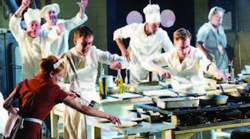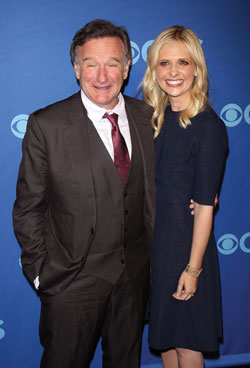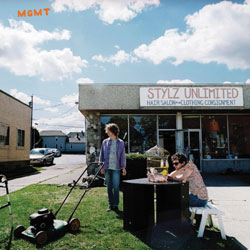Just a few years ago, not many people in New Jersey would have thought about going out to see a live play, especially in London, England. With the revolutionary National Theatre Live, a company that broadcasts performances to cinemas all around the world, watching a live play in England without leaving Monmouth County is now a regular occurrence.
The Pollak Theatre at the University filled quickly with moviegoers of all ages the evening of Thursday, October 6.
From children and college students to parents and grandparents, they could not resist entering the auditorium in anticipation of the fall’s second National Theatre Live presentation, Arnold Wesker’s The Kitchen.
Set in 1950’s London, a seemingly mismatched group of chefs, waitresses and porters – comprised of English, Irish, German, Italian, French and Jewish men and women, struggle to maintain the sanity in their kitchen. The performance included 30 actors and actresses, and maintained a very intense, fast-paced story throughout the duration of the two-act play.
The Kitchen, which has appeared in theatres in over 30 countries worldwide since its debut at London’s Royal Court in 1959, was performed live from National Theatre’s Olivier Stage in London. Combining the high-stress environment of working in The Kitchen of a highly successful English restaurant with the clashing personalities of the characters, the tension in the play was thick enough to be cut with a knife, drawing the audience right into The Kitchen with the staff.
Peter (Tom Brooke), a German cook in love with Monique, a married waitress, struggles to realize what it is he truly wants from life, while the woman he loves is not sure whether she wants to divorce her husband to be with him. Meanwhile, a new cook searches for a way to fit in with the ragtag group of kitchen staff while they bustle about during a typical work day of nonstop service.
The cast, led by Brooke (Pirate Radio), Katie Lyons (The Imaginarium of Doctor Parnassus) and Samuel Roukin (Harry Potter and the Deathly Hallows), put on a performance that kept viewers on the edge of their seats.
The first act did not take much time at all to develop any characters, except for some events that had taken place in the world of The Kitchen prior to the telling of the story. It was mainly focused on exposing the viewer to the agitation and high-stress environment that many kitchens around the world feel on a daily basis, which was one of the goals of Wesker when he originally wrote the play in the 1950’s.
Peter was very excited about working in such conditions, and was not afraid to show his delight as he performed his duties as quickly as he could. However, this could have been his flaw because he did not seem to know how to slow down once the work was completed.
Due to certain restrictions of performing on a stage, the actors could not actually cook real food as props. Instead, they chose to pantomime the food they were cooking, as well as the cooking itself. Jeremy Lee, the cookery consultant behind the scenes, said of the actors during a 10minute break between acts, “These actors were totally committed to learning how to cook. We practiced on real food so they could learn the way chefs really do it in The Kitchen. I am really proud of their dedication to this performance.”
At the end of the first act, Peter asked his male coworkers, who were finished for the day and relaxing after a hard shift in The Kitchen, what their dreams were. The answers he got were typical of that type of discussion, centering on money, wealth, and women. When the question came back to Peter, however, he found that he did not have an answer. This alluded to Peter’s inability to decide what he wanted to do with the rest of his life.
The second act took a hard left turn from the momentum of the first, slowing from the fast-paced work environment to a slow, almost dead workplace. Some of the characters took that time to ponder themselves as Wesker delved deeper into the personalities of the more prominent characters.
Peter spends the rest of the second act trying to figure out what his dream is, and at the very end of the play he still does not have an answer to that question after he breaks down violently and accidentally injures himself in the process.
The play was not so much about plot and story as it was about displaying the repetitive daily routines that normal people go through.
University seniors, Leo Wong and Frank Guido, attended this broadcasted performance and said they found it enjoyable.
Although Wong had to get used to the accents, overall he said, “The actors did a great job portraying their characters.” Meanwhile, Guido said, “I thought it was cool how [the actors] learned how to do all the cooking for the play.”
Future performances include Collaborators, a play by John
Hodge about an imaginary encounter between Joseph Stalin and Russian playwright Mikhail Bulgakov, and William Shakespeare’s Comedy of Errors.
Anyone who wants to come to the shows should visit the box office at the MAC or go to monmouth.edu/arts.
PHOTO COURTESY of guardian.co.uk



